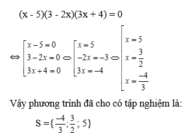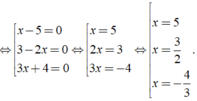

Hãy nhập câu hỏi của bạn vào đây, nếu là tài khoản VIP, bạn sẽ được ưu tiên trả lời.



\(a,\dfrac{x-3}{x}=\dfrac{x-3}{x+3}\)\(\left(đk:x\ne0,-3\right)\)
\(\Leftrightarrow\dfrac{x-3}{x}-\dfrac{x-3}{x+3}=0\)
\(\Leftrightarrow\dfrac{\left(x-3\right)\left(x+3\right)-x\left(x-3\right)}{x\left(x+3\right)}=0\)
\(\Leftrightarrow x^2-9-x^2+3x=0\)
\(\Leftrightarrow3x-9=0\)
\(\Leftrightarrow3x=9\)
\(\Leftrightarrow x=3\left(n\right)\)
Vậy \(S=\left\{3\right\}\)
\(b,\dfrac{4x-3}{4}>\dfrac{3x-5}{3}-\dfrac{2x-7}{12}\)
\(\Leftrightarrow\dfrac{4x-3}{4}-\dfrac{3x-5}{3}+\dfrac{2x-7}{12}>0\)
\(\Leftrightarrow\dfrac{3\left(4x-3\right)-4\left(3x-5\right)+2x-7}{12}>0\)
\(\Leftrightarrow12x-9-12x+20+2x-7>0\)
\(\Leftrightarrow2x+4>0\)
\(\Leftrightarrow2x>-4\)
\(\Leftrightarrow x>-2\)

Ta có: ( x - 5 )( 3 - 2x )( 3x + 4 ) = 0

Vậy phương trình đã cho có tập nghiệm là S = { - 4/3; 3/2; 5 }.

\(\left(2x-5\right)^3-\left(3x-4\right)^3+\left(x+1\right)^3=0\)
\(\Leftrightarrow\left(2x-5-3x+4\right)\left[\left(2x-5\right)^2+\left(2x-5\right)\left(3x-4\right)+\left(3x-4\right)^2\right]+\left(x+1\right)^3=0\)
\(\Leftrightarrow-\left(x+1\right)\left[\left(2x-5\right)^2+\left(2x-5\right)\left(3x-4\right)+\left(3x-4\right)^2\right]+\left(x+1\right)^3=0\)
\(\Leftrightarrow\orbr{\begin{cases}x+1=0\\\left(x+1\right)^2-\left(2x-5\right)^2-\left(2x-5\right)\left(3x-4\right)-\left(3x-4\right)^2=0\left(1\right)\end{cases}}\)
\(\left(1\right)\Leftrightarrow\left(x+1+2x-5\right)\left(x+1-2x+5\right)-\left(2x-5\right)\left(3x-4\right)-\left(3x-4\right)^2=0\)
\(\Leftrightarrow\left(3x-4\right)\left(6-x-2x+5-3x+4\right)=0\)
\(\Leftrightarrow\orbr{\begin{cases}3x-4=0\\-6x+15=0\end{cases}\Leftrightarrow\orbr{\begin{cases}x=\frac{4}{3}\\x=\frac{-5}{2}\end{cases}}}\)


a/ 4x + 20 = 0
⇔4x = -20
⇔x = -5
Vậy phương trình có tập nghiệm S = {-5}
b/ 2x – 3 = 3(x – 1) + x + 2
⇔ 2x-3 = 3x -3+x+2
⇔2x – 3x = -3+2+3
⇔-2x = 2
⇔x = -1
Vậy phương trình có tập nghiệm S = {-1}
câu tiếp theo
a/ (3x – 2)(4x + 5) = 0
3x – 2 = 0 hoặc 4x + 5 = 0
Vậy phương trình có tập nghiệm S= {-5/4,3/2}
b/ 2x(x – 3) – 5(x – 3) = 0
=> (x – 3)(2x -5) = 0
=> x – 3 = 0 hoặc 2x – 5 = 0
* x – 3 = 0 => x = 3
* 2x – 5 = 0 => x = 5/2
Vậy phương trình có tập nghiệm S = {0, 5/2}

Bài 1:
a) (5x-4)(4x+6)=0
\(\Leftrightarrow\orbr{\begin{cases}5x-4=0\\4x+6=0\end{cases}\Leftrightarrow\orbr{\begin{cases}5x=4\\4x=-6\end{cases}\Leftrightarrow}\orbr{\begin{cases}x=\frac{4}{5}\\y=\frac{-3}{2}\end{cases}}}\)
b) (x-5)(3-2x)(3x+4)=0
<=> x-5=0 hoặc 3-2x=0 hoặc 3x+4=0
<=> x=5 hoặc x=\(\frac{3}{2}\)hoặc x=\(\frac{-4}{3}\)
c) (2x+1)(x2+2)=0
=> 2x+1=0 (vì x2+2>0)
=> x=\(\frac{-1}{2}\)
bài 1:
a) (5x - 4)(4x + 6) = 0
<=> 5x - 4 = 0 hoặc 4x + 6 = 0
<=> 5x = 0 + 4 hoặc 4x = 0 - 6
<=> 5x = 4 hoặc 4x = -6
<=> x = 4/5 hoặc x = -6/4 = -3/2
b) (x - 5)(3 - 2x)(3x + 4) = 0
<=> x - 5 = 0 hoặc 3 - 2x = 0 hoặc 3x + 4 = 0
<=> x = 0 + 5 hoặc -2x = 0 - 3 hoặc 3x = 0 - 4
<=> x = 5 hoặc -2x = -3 hoặc 3x = -4
<=> x = 5 hoặc x = 3/2 hoặc x = 4/3
c) (2x + 1)(x^2 + 2) = 0
vì x^2 + 2 > 0 nên:
<=> 2x + 1 = 0
<=> 2x = 0 - 1
<=> 2x = -1
<=> x = -1/2
bài 2:
a) (2x + 7)^2 = 9(x + 2)^2
<=> 4x^2 + 28x + 49 = 9x^2 + 36x + 36
<=> 4x^2 + 28x + 49 - 9x^2 - 36x - 36 = 0
<=> -5x^2 - 8x + 13 = 0
<=> (-5x - 13)(x - 1) = 0
<=> 5x + 13 = 0 hoặc x - 1 = 0
<=> 5x = 0 - 13 hoặc x = 0 + 1
<=> 5x = -13 hoặc x = 1
<=> x = -13/5 hoặc x = 1
b) (x^2 - 1)(x + 2)(x - 3) = (x - 1)(x^2 - 4)(x + 5)
<=> x^4 - x^3 - 7x^2 + x + 6 = x^4 + 4x^3 - 9x^2 - 16x + 20
<=> x^4 - x^3 - 7x^2 + x + 6 - x^4 - 4x^3 + 9x^2 + 16x - 20 = 0
<=> -5x^3 - 2x^2 + 17x - 14 = 0
<=> (-x + 1)(x + 2)(5x - 7) = 0
<=> x - 1 = 0 hoặc x + 2 = 0 hoặc 5x - 7 = 0
<=> x = 0 + 1 hoặc x = 0 - 2 hoặc 5x = 0 + 7
<=> x = 1 hoặc x = -2 hoặc 5x = 7
<=> x = 1 hoặc x = -2 hoặc x = 7/5

1)\(\Leftrightarrow2x^2+3x-14=0\)
\(\Rightarrow3^2-\left(-4\left(2.14\right)\right)=121\)
\(\Rightarrow x_{1,2}=\frac{-b+-\sqrt{D}}{2a}=\frac{-3+-\sqrt{121}}{4}\)
=>\(x=2hoặc-\frac{7}{2}\)
tối nay tôi làm tiếp cho